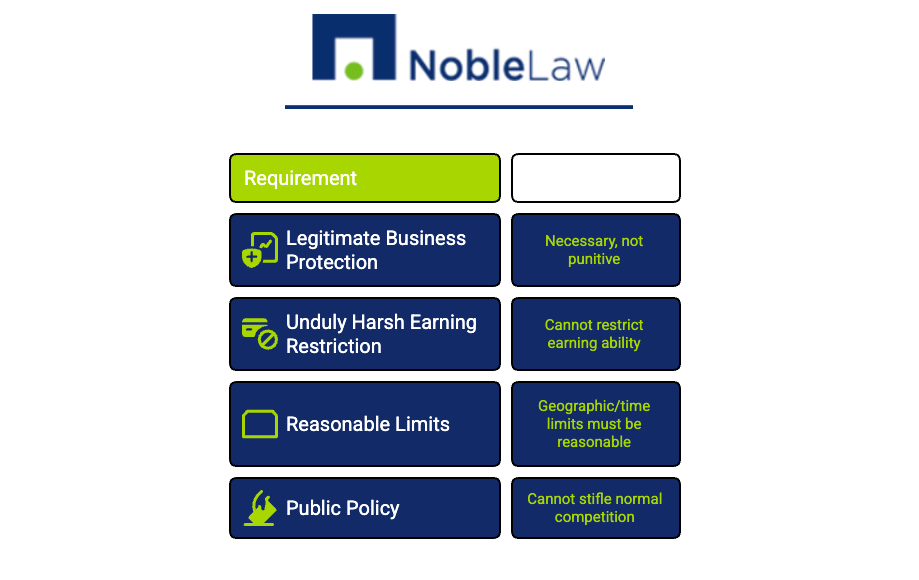Employers don’t want their former employees to join the competition or steal their clients. To that end, they are increasingly turning to non-compete agreements, also known as a covenant not to compete. Non-compete agreements usually restrict former employees from working in particular geographic areas, and/or in particular types of jobs or industries.
The dedicated employment lawyers at The Noble Law can help you regarding the enforcement of non-compete agreements in North and South Carolina.
Non-compete Agreements
Made between a business and an employee, non-compete agreements prevent the latter from working in a specific field in a geographic area for a designated period after leaving the former. For the employer, the goal is generally to keep prior employees from becoming competitors. These former employees know how the business operates and may hold proprietary knowledge.
Is a Non-compete Agreement Enforceable?
In general, South Carolina courts do not favor non-compete agreements. However, South Carolina does enforce non-compete agreements meeting certain criteria. These include:
- Legitimate business protection–The non-compete agreement must prove necessary for the legitimate protection of the business. Such agreements cannot serve as punishment for a former employee.
- Not unduly harsh in allowing the employee to earn a living–The covenant not to compete cannot restrict the ability of a person to earn a living. Agreements deemed unduly harsh are not enforceable under South Carolina law.
- Reasonable geographic and time limits–The geographic and time limits cited in the non-compete agreement cannot cover unreasonably large areas or last for too long a period. The exact factors will vary by the type of business and the employee’s specific role.
- Not against public policy–The non-compete agreement cannot serve simply as an attempt to stifle normal competition. For instance, it could not undermine public health considerations in not allowing healthcare providers to practice in an area in need of such professionals.
North Carolina Is a Blue Pencil State
Unlike South Carolina, North Carolina is a blue-pencil state. That means that if the non-compete agreement is too broad, the court may strike out, or blue-pencil, part of the covenant, allowing the agreement to become more reasonable. While the court may remove certain provisions of the covenant, it cannot otherwise rewrite or revise it.
In North Carolina, all enforceable non-compete agreements between an employer and employee must be in writing and part of the employment contract. As with South Carolina, such agreements must prove “reasonable as to time and territory” and protect only legitimate business interests. For instance, if the agreement states that the geographic territory encompasses the entire U.S. for a period of 10 years, most courts would find that unreasonable. Keep in mind that every non-compete agreement is highly fact-specific and judged on its own merits.
Non-compete Agreement Violations
What happens if your former employer determines you violated the non-compete agreement? They can sue you for that violation. While money damages are involved, most employers will also want to receive an injunction prohibiting non-compete agreement violation. In a worst-case scenario, a temporary restraining order is sought to stop the perceived violation immediately.
Contact a South Carolina Employment Lawyer
If you have questions regarding the enforcement of non-compete agreements, contact the experienced South Carolina employment attorneys at The Noble Law.
About The Noble Law Firm
The Noble Law is a women-owned employment law firm with offices in North Carolina and South Carolina, founded by Laura Noble in 2009. Specializing in wrongful termination, workplace harassment, workplace retaliation, workplace mediation, and neutral third-party investigations, the firm is committed to leveling the playing field for employees. Their focus is on delivering positive outcomes with empathy and integrity, while also driving societal change in employment law.
The firm emphasizes diversity, collaboration, and innovation, fostering a balanced work environment that values the personal lives of its staff. With a strong commitment to technology and efficiency, The Noble Law provides personalized attention to a select group of clients, handling cases involving harassment, discrimination, retaliation, and more. The team’s extensive litigation experience allows them to deliver thorough and assertive representation.


